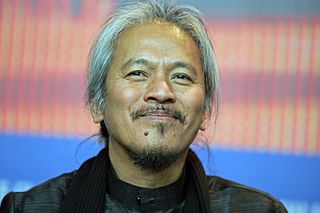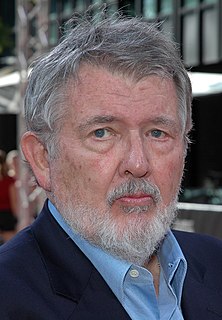A Quote by Simon Pegg
Films used to be about challenging, emotional journeys or moral questions that might make you walk away and re-evaluate how you felt about... whatever. Now we're walking out of the cinema really not thinking about anything, other than the fact that the Hulk had a fight with a robot.
Related Quotes
I do not make films which are prescriptive, and I do not make films that are conclusive. You do not walk out of my films with a clear feeling about what is right and wrong. They're ambivalent. You walk away with work to do. My films are a sort of investigation. They ask questions . . .. Sometimes I hear that some [Hollywood] studio is interested in me. Then they discover that this is the guy who works with no script, that there is no casting discussion, no interference, that I have the final cut, and that does it.
In thinking of light, if we can think about what it can do, and what it is, by thinking about itself, not about what we wanted it to do for other things, because again we've used light as people might be used, in the sense that we use it to light paintings. We use it to light so that we can read. We don't really pay much attention to the light itself. And so turning that and letting light and sound speak for itself is that you figure out these different relationships and rules.
I have always been really picky about the films that I make, because I think that there's such an incredible opportunity to bring up questions when you're making movies, and some of my favorite films bring up big questions. They are movies that, when you walk away from it, it hits you as something deeper, and it's a great, fun way to be able to bounce around some of these harder concepts in our heads.
...she could express her soul with that voice, whenver I listened to her I felt my life meant more than mere biology...she could really hear, she understood structure and she could analyze exactly what it was about a piece of music that had to be rendered just so...she was a very emotional person, Annette. She brought that out in other people. After she died I don't think I ever really felt anything again.
Now I know that if I'm in a fight or a big argument with executives or the studio or whoever, and it's getting to a point where it's starting to get bad, I don't have to have the fear of, "Am I strong enough to see this through? Would I really make a stand here? Would I really quit over this issue?" And I know in my heart that there is a place where I would walk away. I don't have to make it about my ego. I don't have to make it about whether I'm being strong enough or tough enough.
Conversations about films are always funny. I would say a majority of people want to talk about what were the more obvious successes; the big box office films. Other people wanting to be more sensitive to you want to talk about the ones that maybe didn't make a lot of money, but they think you might have a special feeling about. And then other people sometimes want to help you by suggesting that you should have done this or that in the movie, that that would have helped you a great deal in whatever capacity.
When people say stuff to us casually in reviews, if they write about it in a condescending way with really gendered language, that's not really about me. It used to hurt my feelings more than it does now. That's not about us as a band or me as a person. That's about how you feel about women, and that's a societal thing.
More than my other films, Uncle Boonmee is very much about cinema, that's also why it's personal. If you care to look, each reel of the film has a different style - acting style, lighting style, or cinematic references - but most of them reflect movies. I think that when you make a film about recollection and death, you have to consider that cinema is also dying - at least this kind of old cinema that nobody makes anymore.


































